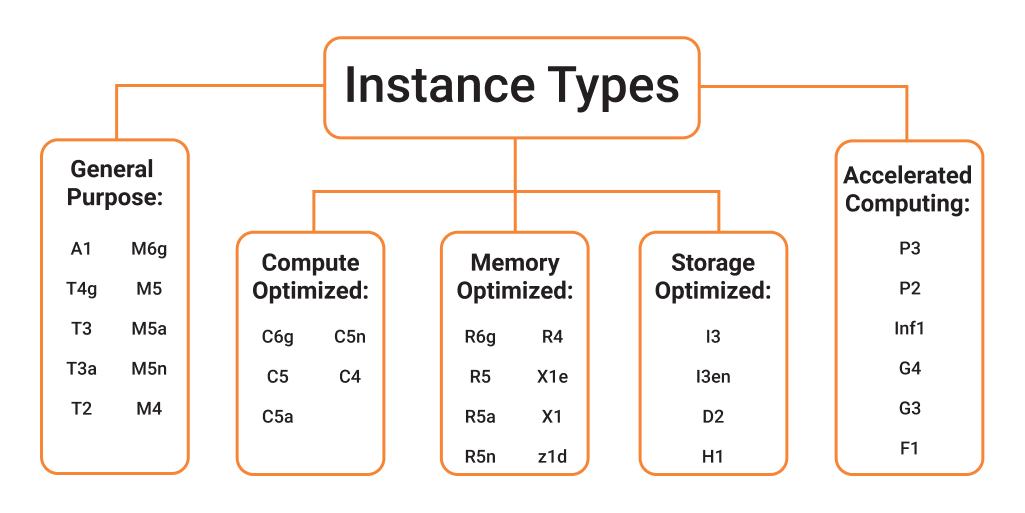Learning the Concept of Instance Naming.
Let's break down the t2.micro as an example:
First letter (t): Instance family (e.g., t - Burstable, m - General Purpose, c - Compute Optimized)
Number (2): Hierarchy within the family (higher number usually signifies newer architecture)
Size (micro): Resource configuration (micro - smallest, large, xlarge, etc.)
Types of Instances
AWS provides a diverse selection of instance types that are classified based on their primary utilization:

General Purpose (A Series, M Series): Efficient distribution of computing resources, memory, and storage to meet the needs of various applications.(e.g., web servers, databases).
Compute Optimized (C Series, R Series): Enhanced computational capabilities for tasks requiring high processing power (e.g., scientific computing, video processing).
Memory Optimized (R Series, Z Series): Extensive memory capacity for in-memory analytics and databases. (e.g., real-time analytics, large datasets).
Storage Optimized (D Series, ST Series): Large storage bandwidth and capacity for data-intensive applications.(e.g., log processing, data warehousing).
Accelerated Computing (P Series, G Series): Specialized hardware designed for tasks that demand GPUs, FPGAs, or machine learning accelerators is available.(e.g., graphics rendering, scientific simulations).
Other Instance Types
1. Reserved Instances
Significant discounts are provided in comparison to on-demand pricing; however, a commitment upfront is necessary.
All Upfront: Paying the complete upfront cost for the reserved instance guarantees the highest discount available.
Partial Upfront: Reduce your initial payment by opting for a decreased hourly fee.
Scheduled Instances: Reserve instances offer the opportunity to allocate capacity for specific time periods on a daily or weekly basis, ensuring availability when needed. By reserving instances, users can secure capacity reservations at a significantly reduced cost compared to the regular price.
Standard Reserved Instances: Compared to other types, these Reserved Instances offer the highest discount rates. They have the lowest hourly rates, although there are limitations in modifying instance attributes.
Convertible Reserved Instances: Convertible Reserved Instances (RIs) offer enhanced flexibility despite offering slightly reduced discounts in comparison to Standard RIs. Throughout the term, users have the ability to modify various instance attributes such as instance type, operating system, or tenancy. This added flexibility allows users to adapt their instances to meet changing requirements and optimize their usage accordingly.
2. Spot Instances
Significant cost savings can be provided by them, although their availability may vary. Various types are available.
One-Time Spot Instances: Place a bid on a particular instance for a predetermined duration. These instances are well-suited for temporary workloads that require flexibility in terms of their start and end times.
Interrupt Spot Instances: AWS has the authority to reclaim the instance at any given moment; however, they provide the most competitive prices in the market.
Persistent Spot Instances: These instances continue running until the user terminates them or the Spot price exceeds the bid price. They are ideal for workloads that require continuous availability with potential interruptions.
Spot Blocks: AWS offers users the convenience of a predetermined timeframe for running instances, which in turn ensures both stability and predictability. By allowing users to specify a duration ranging from 1 to 6 hours, along with a maximum price, AWS guarantees the availability of capacity for the specified duration. This feature provides users with the assurance that their instances will run smoothly and reliably within the designated timeframe.
Choosing Between Spot and Reserved Instances
Spot Instances: Ideal for fault-tolerant workloads that can handle interruptions and unpredictable availability.
Reserved Instances: Suitable for workloads that exhibit predictability and allow for upfront cost commitments, resulting in substantial savings.

Important Instance Families
General Purpose: A Series (cost-optimized), M Series (balanced)
Compute Optimized: C Series (high CPU), R Series (memory-optimized CPUs)
Memory Optimized: R Series (powerful CPUs, high memory), Z Series (extreme memory)
Storage Optimized: D Series (HDD-based), ST Series (SSD-based)
Load Testing
Load testing replicates actual user traffic to evaluate how well an application performs when under stress. It helps in:
Choose the right instance type: Identify the instance that can handle your expected traffic without compromising performance.
Scale your infrastructure: Plan for future growth and ensure your instances can handle increased load.

AWS Pricing
Pay-as-you-go: Charges are calculated according to the usage of resources per hour or second.(e.g., instance type, storage, network traffic).
On-Demand Instances: Suitable for short-term workloads or fluctuating usage patterns.
Reserved Instances: Acquire pre-paid capacity for a set duration (either 1 or 3 years) with a substantial reduction in price.
Spot Instances: Participate in auctions for unutilized EC2 capacity at significantly reduced rates, although the assurance of availability is not provided.
OS: The pricing structure generally remains consistent among different Linux distributions, while Windows and specialized licenses may incur supplementary expenses.
Factors Affecting Discount
Instance family and size: Typically, higher-priced instances are associated with larger sizes and increased computing capabilities.
Region: Pricing may vary depending on the AWS region where you launch the instance.
Commitment term (Reserved Instances): Longer commitment terms offer steeper discounts.
Dedicated Hosts
This offering guarantees that you have exclusive access to physical servers within an AWS data center that are dedicated solely to your usage. Which provides
Consistent performance: Minimizes the chance of loud neighbors (other cases on shared hardware).
Greater control: You have more control over the underlying hardware and software environment.
Saving Plans
Saving plans provide an assurance of utilizing a particular level of resources for either a 1 or 3-year duration, in return for a reduced price on your total computing expenses across different types of instances and services.
Summary:

